Related Research Articles

XTC were an English rock band formed in Swindon in 1972. Fronted by songwriters Andy Partridge and Colin Moulding, the band gained popularity during the rise of punk and new wave in the 1970s, later playing in a variety of styles that ranged from angular guitar riffs to elaborately arranged pop. Partly because the group did not fit into contemporary trends, they achieved only sporadic commercial success in the UK and US, but attracted a considerable cult following there and in Japan. They have since been recognised for their influence on post-punk, Britpop and later power pop acts.
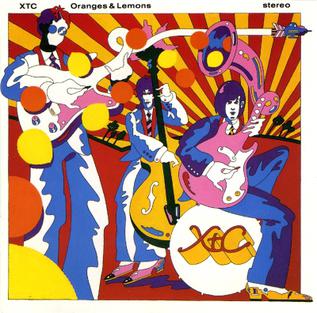
Oranges & Lemons is the 11th studio album and the second double album by the English band XTC, released 27 February 1989 on Virgin Records. It is the follow-up to 1986's Skylarking. The title was chosen in reference to the band's poor financial standing at the time, while the music is characterised as a 1980s update of 1960s psychedelia. It received critical acclaim and became the band's highest-charting album since 1982's English Settlement, rising to number 28 in the UK and number 44 in the US.

Black Sea is the fourth studio album by the English rock band XTC, released 12 September 1980 on Virgin Records. It is the follow-up to the previous year's Drums and Wires, building upon its focus on guitars and expansive-sounding drums, but with more economical arrangements written with the band's subsequent concert performances in mind, avoiding overdubs unless they could be performed live.

English Settlement is the fifth studio album and first double album by the English rock band XTC, released 12 February 1982 on Virgin Records. It marked a turn towards the more pastoral pop songs that would dominate later XTC releases, with an emphasis on acoustic guitar, 12-string electric guitar and fretless bass. In some countries, the album was released as a single LP with five tracks deleted. The title refers to the Uffington White Horse depicted on the cover, to the "settlement" of viewpoints, and to the Englishness that the band felt they "settled" into the record.
"Garden of Earthly Delights" is a song written by Andy Partridge of the English rock band XTC, released as the opening track on their 1989 album Oranges & Lemons. Partridge wrote the song as a children's guide to the world dedicated to his son Harry Partridge. He intended it to sound "like this crazy tapestry of camels and elephants and belly dancers and all the Arabian Nights, interwoven -- a big ornate Eastern rug come to life." It features Arabic modalities and a guitar solo played through two harmonizers set to different intervals.

Nonsuch is the 12th studio album by the English band XTC, released 27 April 1992 on Virgin Records. The follow-up to Oranges & Lemons (1989), Nonsuch is a relatively less immediate and more restrained sounding album, carrying the band's psychedelic influences into new musical styles, and displaying a particular interest in orchestral arrangements. The LP received critical acclaim, charted at number 28 in the UK Albums Chart, and number 97 on the US Billboard 200, as well as topping Rolling Stone's College album chart.
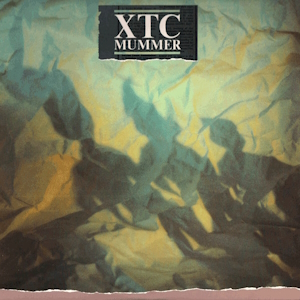
Mummer is the sixth studio album by the English rock band XTC, released on 30 August 1983. It reached No. 51 on the UK album chart and No. 145 on the U.S. Billboard album charts. The album title refers to a Mummers play. A working title considered for the album was Fruit Fallen From God's Garden.

Drums and Wires is the third studio album by the English rock band XTC, released 17 August 1979 on Virgin Records. It is a more pop-oriented affair than the band's previous, Go 2 (1978), and was named for its emphasis on guitars ("wires") and expansive-sounding drums. The album was their first issued in the United States and their first recorded with guitarist Dave Gregory, who had replaced keyboardist Barry Andrews earlier in 1979. It features a mix of pop, art rock, new wave and punk styles with much rhythmic interplay between XTC's two guitarists.

Skylarking is the ninth studio album by the English rock band XTC, released 27 October 1986 on Virgin Records. Produced by American musician Todd Rundgren, it is a loose concept album about a nonspecific cycle, such as a day, a year, the seasons, or a human being’s life. The title refers to a type of bird (skylark), as well as the Royal Navy term "skylarking", which means "fooling around". It became one of XTC's best-known albums and is generally regarded as their finest work.

The Big Express is the seventh studio album by English rock band XTC, released on 15 October 1984 by Virgin Records. It is an autobiographical concept album inspired by the band's hometown of Swindon and its railway system, the Swindon Works. In comparison to its predecessor Mummer (1983), which had a modest, pastoral approach to production, the album features a bright, uptempo sound marked by studio experimentation and denser arrangements, setting a template that they further developed on subsequent albums.
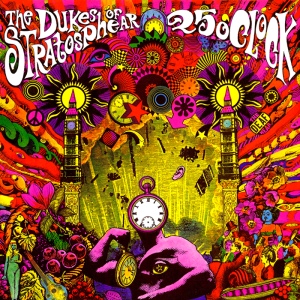
25 O'Clock is the debut record by English rock band the Dukes of Stratosphear and the eighth studio album by XTC, released on April Fools Day 1985 through Virgin Records. It was publicised as a long-lost collection of recordings by a late 1960s group, but actually consisted of new tracks recorded by Andy Partridge, Colin Moulding, and Dave Gregory of XTC with Gregory's brother Ian.

"Senses Working Overtime" is a song written by Andy Partridge of the English rock band XTC, released as the lead single from their 1982 album English Settlement. He based the song on Manfred Mann's "5-4-3-2-1" (1964). The album and single became the highest-charting records XTC would ever have in the UK, peaking at number five and number 10, respectively.

"Dear God" is a song by the English rock band XTC that was first released as a non-album single with the A-side "Grass". Written by Andy Partridge, it was inspired by a series of books with the same title, seen by Partridge as exploitation of children. The song was originally intended for the album Skylarking, but left off due to concerns from Partridge and Virgin Records. After college radio DJs across America picked up the song, US distributor Geffen Records recalled and re-pressed Skylarking with the track included.

"Making Plans for Nigel" is a song by the English rock band XTC that was released as the opening track and lead single from their 1979 album Drums and Wires. It was written by Colin Moulding, the band's bassist. The lyrics are told from the point of view of parents who are certain that their son Nigel is "happy in his work", affirming that his future in British Steel "is as good as sealed", and that he "likes to speak and loves to be spoken to."

"Grass" is a song written by Colin Moulding of the English rock band XTC, released as the lead single from their 1986 album Skylarking. It reached number 100 on the UK Singles Chart.
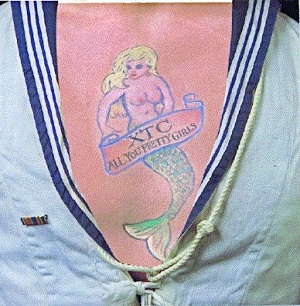
"All You Pretty Girls" is a song written by Andy Partridge of the English rock band XTC, released on their 1984 album The Big Express. It peaked at number 55 on the UK Singles Chart, and its music video cost £33,000 to make. Partridge remembers that song came about while he was "dicking around, playing some Hendrix. ... I was just playing this little two-note, quasi-Hendrix thing, and I liked the inherent melody in it."

"Seagulls Screaming Kiss Her Kiss Her" is a song written by Andy Partridge of the English rock band XTC, released on their 1984 album The Big Express. Composed on a Mellotron using only three fingers, it was the first song he wrote on a keyboard instrument. The lyrics were inspired by Erica Wexler, a fan who caused tensions with Partridge's then-wife. After his divorce, Partridge married Wexler in the 1990s. Japanese band Seagull Screaming Kiss Her Kiss Her named themselves after the song.
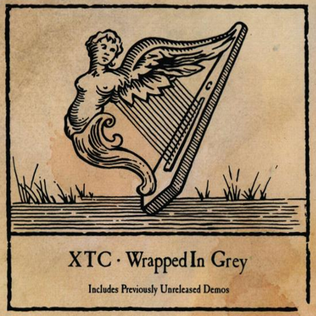
"Wrapped in Grey" is a song written by Andy Partridge of XTC, released on their 1992 album Nonsuch. It was to be issued as the third single from the album, but its initial pressings were withdrawn by Virgin Records for an unknown reason. This was a stimulus for the band to go on "strike" against the label for a few years until their contracts were terminated.

"Wake Up" is a song written by Colin Moulding of the English rock band XTC, released as the opening track on their 1984 album The Big Express. It was the third and last single issued from the album, following "All You Pretty Girls" and "This World Over", and peaked at number 92 on the UK Singles Chart.

"Respectable Street" is a song written by Andy Partridge of XTC, released as the opening track on their 1980 album Black Sea. According to Partridge, the song is about English streets and "the hypocrisy of living in a so-called respectable neighborhood. It's all talk behind twitching curtains. It's all Alan Bennett land." Discounting the Canada-only "Love at First Sight", it was the fourth and last single issued from the LP. BBC Radio banned the song because of its references to abortion and a "Sony Entertainment Centre".
References
- ↑ Jennings, Dave (18 October 2014). "XTC: The Big Express – A Thirtieth Anniversary Celebration – album reappraisal". Louder Than War. Retrieved 24 October 2018.
- 1 2 3 Farmer 1998, p. 169.
- ↑ Farmer 1998, pp. 169, 171.
- ↑ Gregory, Dave; Moulding, Colin; Partridge, Andy (November 1984). "Recording The Big Express". One Two Testing (16).
- ↑ Morrissey (October 1984). "Singles Reviewed By". Smash Hits . p. 19.
- ↑ "Official Singles Chart Top 100". Official Charts Company. Retrieved 1 March 2021.
Works cited
- Farmer, Neville (1998). XTC: Song Stories: The Exclusive Authorized Story Behind the Music. London: Helter Skelter Publishing. ISBN 190092403X.